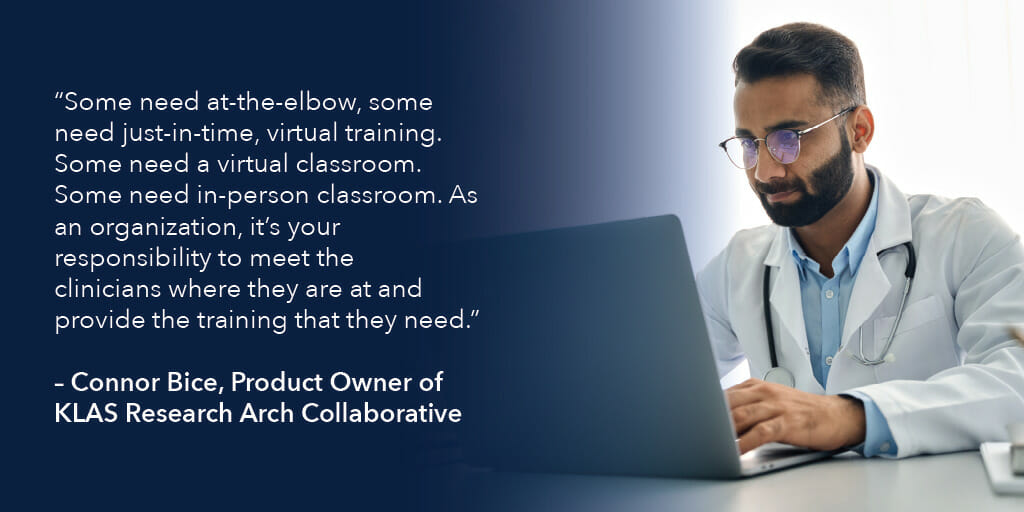Low EHR satisfaction scores have a direct correlation with clinician burnout, but health systems are finding new ways to move the needle and improve satisfaction with a focus on EHR education.
Tune into this Becker’s Healthcare podcast, featuring Connor Bice, product owner of KLAS Research Arch Collaborative and Liz Griffith, director of EHR education at uPerform and former director of customer insights at KLAS. The two share their passion for, and experience, working with leading health systems to measure EHR satisfaction and developing strategies for improving it.
For a full audio transcript, visit our Buzzsprout page.
“What we are hoping to do with this podcast, and with uPerform and with the Arch Collaborative, is to help raise awareness and help organizations understand that EHR satisfaction should be a strategic priority for them.” — Connor Bice, KLAS Arch Collaborative
Reduce clinician burnout with workflow training
Connor and Liz both note that clinician burnout is a complex and multifaceted crisis. While they acknowledge that EHR education is only one piece of a larger solution, they share a passion for its potential to make an impact.
Connor emphasizes the data gathered by KLAS Research, noting that “31% of satisfaction with [a clinician’s] EHR can be attributed to their agreement of how well they’ve been trained.” He adds that training clinicians specifically on how to complete their workflows correlates with significantly lower levels of burnout.
Deliver EHR workflow training to clinicians
KLAS Arch Collaborative data suggests that EHR workflow training is the most effective way to improve EHR satisfaction. However, delivering that training hasn’t always been easy. “Prior to the pandemic…one of the number one conversations we always had was, ‘well we offer training, but we can’t get people into the classroom,’” notes Liz. Since Covid-19, getting clinicians into the classroom has only become more difficult.
Liz suggests health systems make the shift from asking “’How do we get people into classrooms?’ to ‘How do we get training into the hands of our clinicians at the time they need it?’” She also suggests shifting the language used from ‘training’ to ‘education’ or ‘learning.’ Connor shares a similar sentiment, using the analogy of a professional athlete that works with a coach to constantly improve their craft. This shift in language represents a shift in perspective to actively engage clinicians in their learning journeys. Most importantly, Connor and Liz both agree that there is not a one-size-fits-all approach to EHR education and that health systems must use a variety of tools and resources to support clinicians.
Drive EHR satisfaction with a learning ecosystem
For Connor, the most important thing for health systems to do is prioritize their training efforts: “We get asked all the time, ‘What type of training is the best type of training?’ And our answer is ‘Training.’” He elaborates, noting that “some training is better than nothing” and that health systems should focus on doing anything they can. He shares that KLAS likes to talk about it as “arrows in the quiver.” Different styles of learning work better for different individuals and offering a variety of training, or learning, opportunities is best.
Liz agrees and says, “we often use the term ‘a hybrid approach,’ right? A comprehensive learning ecosystem is the term we really like to use.” And while they understand that there’s no one strategy that will work for each health system, they each note some training strategies they’ve seen work well for their clients.
Virtual training: Connor and Liz both agree that virtual training is here to stay. Many health systems were forced to adopt virtual training strategies to meet the challenges of Covid, and they don’t see themselves going back in a post-Covid world. Some of the benefits of virtual training include expedited onboarding, reduced burden on training teams and the ability for clinicians to engage in training when and where it makes most sense for them.
Connor does caution, however, that health systems shouldn’t rely solely on virtual training, as they would be “likely missing out on a target audience who would benefit from a different type of training.”
Just-in-time training: Taking virtual training a step further, Liz emphasizes the value of a just-in-time training solution, meaning clinicians can access learning materials at their time of need. uPerform delivers this with integrated training in the clinician’s workflow. Liz touts a case study in which KLAS measured the success of a just-in-time training program implemented by Baylor Scott & White Health (BSW) with the help of uPerform. Users of uPerform’s just-in-time support content at BSW rated their Net EHR Experience Score 12 points higher than non-users, a figure Liz emphasizes as statistically significant.
Workflow training: As mentioned previously, both Connor and Liz stress the importance of delivering training that is workflow specific. Once again, Liz references customer data. When M Health Fairview began embedding learning materials in the workflow for their new eConsent navigator, adoption of the new tool increased from just 7% to 87%. Liz likens this strategy to how social media captures the attention span of its users and stresses that organizations need to think about how they deliver learning to users.
One-on-one coaching: Offering virtual courses has benefitted learning teams too. It can help free up training staff to offer one-on-one coaching or at-the-elbow support, as needed. Liz points to one client as an example:
“[Gundersen Health System] implemented what they call EnlightenMe labs, where people can come and do a much more condensed, shorter kind of virtual lab on a computer training. But [virtual training] has opened up those trainers who used to have to teach for hours at a time to be one-on-one coaches.”
Personalization: Connor and Liz also note the importance of EHR personalization. “Not change the code of the system itself, but those small tweaks to change the layout of your screen or to access the data that you need…” Connor clarifies. Allowing clinicians to work through more basic training modules at their own pace with virtual training opportunities can free up trainers to work with clinicians on personalizing their workflows for greater efficiency.
Empower clinicians with EHR education
While the strategies outlined by Connor and Liz are not exhaustive, they do provide a great launchpad for organizations who want to start thinking about their EHR learning ecosystem, and the strategies are backed by data. For organizations looking to improve EHR satisfaction in hopes of reducing clinician burnout, they should prioritize EHR education. They should offer multiple training methods that meet learners where they are and provide workflow-specific learning opportunities.
Related Articles
Deliver virtual training in the workflow with uPerform
uPerform is a just-in-time learning platform that integrates with your EHR, ERP, HCM and other enterprise applications to centralize software training and support. uPerform delivers personalized education to clinicians directly in their workflow, reducing frustration and driving EHR satisfaction. Contact us today to learn more about how uPerform can turn training time into patient time.
About KLAS Research Arch Collaborative
KLAS has been providing accurate, honest, and impartial insights for the healthcare IT (HIT) industry since 1996. The KLAS mission is to improve the world’s healthcare by amplifying the voice of providers and payers. The scope of our research is constantly expanding to best fit market needs as technology becomes increasingly sophisticated. KLAS finds the hard-to-get HIT data by building strong relationships with our payer and provider friends in the industry. Learn more at https://klasresearch.com/.







